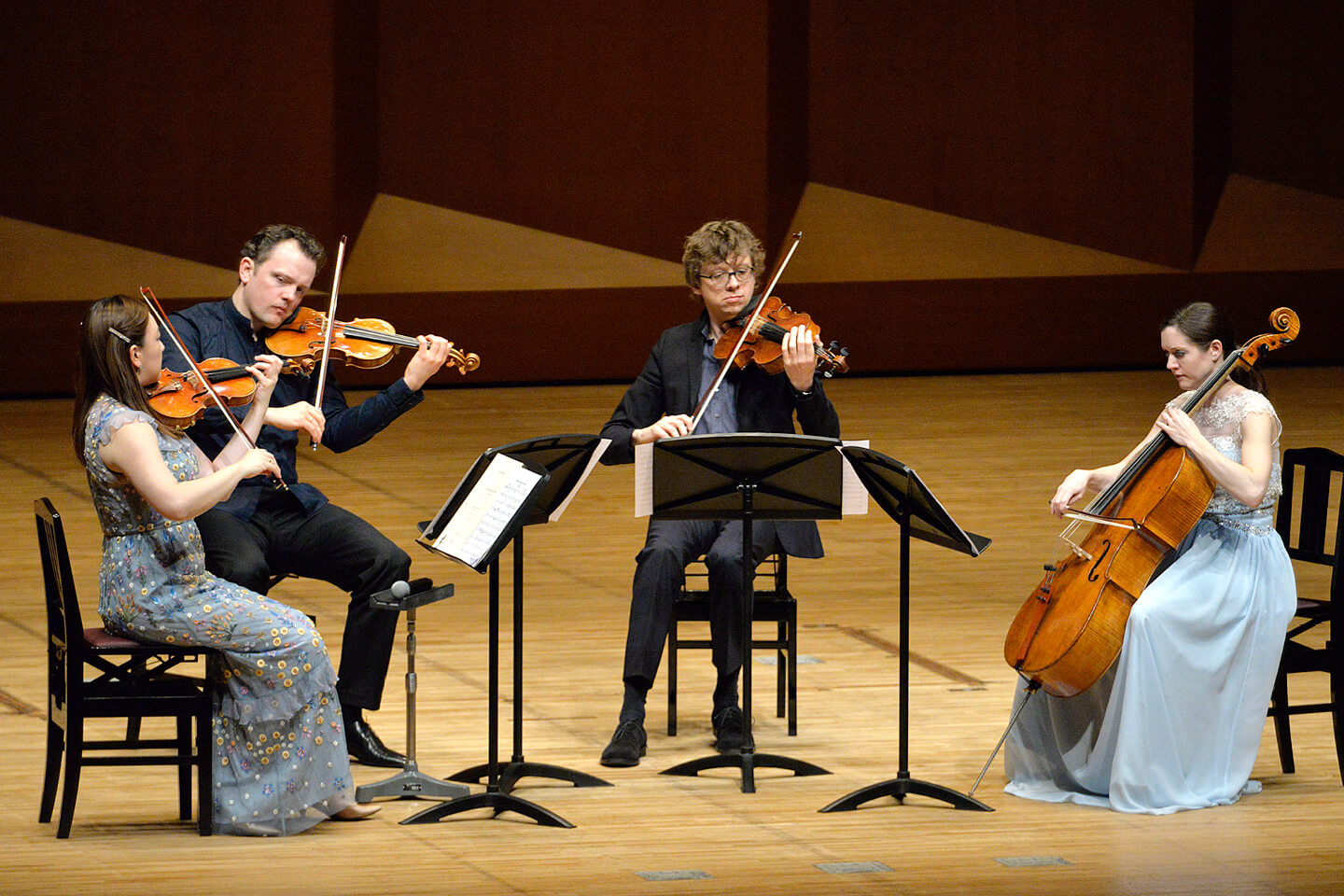To commemorate the 35th anniversary of the reunification of Germany, Min-On Concert Association invited the Pangaea Trio Berlin to Japan to perform from February 25 to March 9.
This extraordinary trio is comprised of members from the renowned Berlin Philharmonic Orchestra, featuring Marlene Ito, the first-ever female principal of the second violins, who was born in Japan and raised in Australia, Uladzimir Sinkevich, a talented cellist from Belarus, and Yannick Rafalimanana, a French pianist.

♦ Profile
Marlene Ito / Violin
1st Principal of the 2nd Violins of the Berliner Philharmoniker. When her mother asked her if she would like to learn the violin, the four-year-old Marlene had no idea what it was, but from her first lesson, she was excited with the instrument. After studying at the conservatory in Sydney with Goetz Richter, in 2003 Marlene Ito went to Germany, where she continued her training at the Lübeck Musikhochschule as well as at the Universität der Künste in Berlin with Nora Chastain.
We are deeply honored to have had the opportunity to interview Marlene Ito during this very special occasion.
Min-On: Thank you for taking the time to talk with us. Could you share how the idea of the name “Pangaea” is linked to your concept of the trio? Also, what else do you have in mind with your music?
Marlene Ito: The members of the Pangaea Trio Berlin come from different backgrounds. Our pianist Yannick is French with Madagascan roots, and Uladzimir is from Belarus who studied in Germany. As for me, I was born in Japan, raised in Australia, and studied in Germany. Somehow, we came together, found each other, and connected musically. For me, it’s a miniature version of what society could be like united through music. Music is a universal language that doesn’t discriminate based on where you come from. This is the message we would like to share with the world. It’s a lot of fun to play in this ensemble, and we hope to extend this joy to the audience. We also hope to share Western music with the Japanese audience.
As for the future, we want to play music from other continents, while staying true to our name, Pangaea, and continue to deepen our knowledge in music.

Min-On: This is your third collaboration with Min-On. What message do you hope to convey to the audience through this performance?
Marlene Ito: Well, first of all, it’s been my goal to bring as many Berlin Philharmonic members to Japan and for them to get to know Min-On and the heart of my mentor, Daisaku Ikeda. On the flip side, I want the Japanese audience, to get to know the Berlin Philharmonic members in a chamber music stage.
I think a lot of the audience from Min-On, are not necessarily classical music goers, or maybe they don’t have the access to listen to the Berlin Philharmonic. But in this chamber music setting, they can experience what we do in Berlin. It’s a lot of fun playing with the Pangaea Trio Berlin. Right now, on tour we are trying to break through our own limits by trying to play more freely and expressively with much emotion, and to really discover the depths of the masterpieces that we are playing from the piano trio repertoire.
If in any way we can share this journey with the audience, it would make us really happy. Just as I was moved by listening to music when I was a child, if there’s just one person in the audience who can experience what I feel when I play violin with this ensemble, that would be a source of joy for me.

Min-On: You became the first female principal of the second violins in the Berlin Philharmonic after joining in 2011. What motivated you to keep pursuing your career despite the challenges?
Marlene Ito: My main source of inspiration is purely my love of music. I play the violin because that’s all I want to do. There surely are the daily challenges of being in this high-voltage orchestra like the Berlin Philharmonic but I always return to this question—why do I do it? It’s because I love music.
Another important factor is the sense of gratitude I have. When I started in the orchestra as a young violinist, I observed how the older members worked hard behind the scenes, both administratively and artistically. I knew from the beginning that I wanted to do the same. When a leading position opened nine years later, I was lucky enough to win it. But for me, it wasn’t really about whether I won this audition or not. I thought, if it’s my mission to somehow give back to the orchestra, then that’s the right job for me. If not, I could still contribute in an administrative role or just by simply being a better friend to my colleagues. That would make me happy. So, I think my sense of gratitude and pure love for music has been my driving force.
Min-On: Is there any message you’d like to share with young aspiring musicians?
Marlene Ito: I think one of the most important things is to love music and know why you’re doing it. If it’s just to become famous, make money, or simply because you’re good at it, I think you’ll encounter some limitations. If you stay curious, listen to really great music, and work patiently on yourself, that will help you keep going. Because there’s so much competition, and many hardships along the way. So, if you know what you’re doing it for, I think that’s a big help. Also, practice. It’s like becoming a pilot. Without practicing to be a pilot, similarly, you need to practice to get good at your craft.
Another important thing is to play with a lot of other musicians. Don’t just practice at home alone, but engage in music-making with others. And finally, discover life. Take in all the hardships that come your way.
Personally, if I go through suffering, I can channel that suffering into my music-making. Music gives you a way to express those emotions. Don’t take anything for granted. Embrace it all, discover life, practice, and listen to the best music you can for inspiration.

◆ Please enjoy the full interview below:
If you have any comments regarding this article, please feel free to email us at: publicrelations@min-on.or.jp
Min-On Concert Association
–Music Binds Our Hearts–





